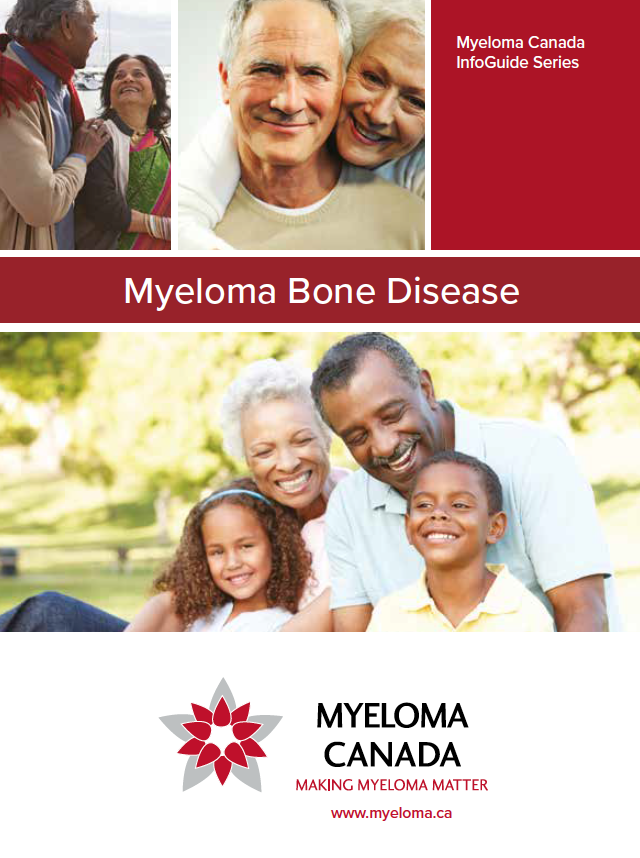Myeloma-related disorders and diseases

MGUS and SMM
Conditions such as Monoclonal Gammopathy of Undetermined Significance (MGUS) and Smouldering Multiple Myeloma (SMM) are typically asymptomatic and may be precursors to active (or symptomatic) myeloma. A history of solitary plasmacytomas may also be a precursor to the disease.

Myeloma bone disease
The most common and debilitating feature of myeloma is the effect it has on the bones throughout the body.
In fact, more than 70% of patients experience bone pain and have evidence of myeloma bone disease when they’re diagnosed. Almost all people with myeloma, at some point in their myeloma journey, will have myeloma bone-related disease.
But… isn’t myeloma a blood cancerA term for diseases in which malignant cells divide without control. Cancer cells can invade nearby tissues and spread through the bloodstream and lymphatic system to other parts of the body.?
Yes. Even though it affects the bones, myeloma is considered a blood cancer because it is caused by abnormal plasma cellsSpecial white blood cells that produce antibodies. The malignant cell in myeloma. Normal plasma cells produce antibodies to fight infection. In myeloma, malignant plasma cells produce large amounts of abnormal antibodies that lack the capability to fight infection. The abnormal antibodies are the monoclonal protein, or M protein. Plasma cells also produce other chemicals that can cause organ and tissue damage (i.e. anemia, kidney damage and nerve damage). (myeloma cells) produced in the bone marrowSpongy tissue that is found inside your bones. It is soft, fatty and full of blood vessels. Your bone marrow is where most of the blood cells in your body are made..
How bone disease occurs in myeloma
Throughout our lives, our bones are constantly being remodeled by two types of complementary cells known as osteoblasts and osteoclasts.
Osteoclasts break down old bone, while osteoblasts form new bone to replace it. Under normal conditions, both types of cells keep the rate of bone formation and bone breakdown equal, so that bone mass remains the same.
In myeloma, abnormal plasmaThe liquid part of the blood in which red blood cells, white blood cells, and platelets are suspended. cells (myeloma cells) send signals that prevent osteoblasts from building new bone and speed up the breakdown activity of osteoclasts.
In other words, the bone breaks down faster than it can be built up or renewed.
Other myeloma-related disorders
People with myeloma are at increased risk of developing kidney disease.
- At least 20% of people with myeloma have some degree of kidney disease at the time they’re diagnosed.
- Up to 50% of people develop kidney disease at some point during the course of their myeloma.
It’s important to understand why myeloma increases the risk of kidney disease and what you can do to reduce your risk.
Myeloma kidney disease can occur for a variety of reasons:
- The abnormal protein produced by myeloma cells blocks tubules in the kidney.
- Other complications of myeloma, such as dehydration or a high calciumMineral found mainly in the hard part of bone. level (hypercalcemiaA higher-than-normal level of calcium in the blood. This condition can cause a number of symptoms, including loss of appetite, nausea, thirst, fatigue, muscle weakness, restlessness, and confusion. Common in myeloma patients and usually resulting from bone destruction with release of calcium into the blood stream. Often associated with reduced kidney function since calcium can be toxic to the kidneys. For this reason, hypercalcemia is usually treated on an emergency basis using IV fluids combined with drugs to reduce bone destruction along with direct treatment for the myeloma.).
- Some of the drugs used in the treatment of myeloma can cause or contribute to myeloma kidney disease.
AL amyloidosis is a collection of conditions that occur when amyloid, an abnormal protein made by the plasma cells, collects in body organs, such as the kidneys, the gastrointestinal tract, the heart, or the nervous system.
- Although approximately 10% to 15% of people with myeloma will have or develop AL amyloidosis, it’s rare for people with amyloidosis to develop myeloma.
- AL amyloidosis is usually treated with chemotherapyThe treatment of cancer with drugs that kill all rapidly-dividing cells. Treatment with one or more drugs that kill all rapidly-dividing (cancer) cells. Chemotherapy can reduce the number of myeloma cells in the bone marrow and the M-protein they produce. Chemotherapy cannot “cure” myeloma but it may stop it from progressing or getting worse for a period of time., using the same drugs that are used to treat myeloma.
Waldenstrom’s macroglobulinemia is a rare form of plasma cellThe basic unit of any living organism. cancer characterized by an uncontrolled production of IgMUsually associated with Waldenstrom's macroglobulemia. In rare cases can be a type of myeloma., which causes the blood to thicken.
- Symptoms can include enlarged nymph nodes, spleen, or liver; fatigue caused by anemiaDecreased blood hemoglobin level. Hemoglobin is found in red blood cells and carries oxygen around the body.; headaches; weight loss; a tendency to bleed easily; visual problems; confusion; and dizziness.
- In extreme cases, the increased levels of IgM in the blood can lead to heart failure.
LCDD occurs in a very small percentage of myeloma patients as a result of abnormal light chains collecting in organs, such as the kidneys.
POEMS syndrome is a rare blood disorder associated with an uncommon type of myeloma called osteosclerotic myeloma and a condition known as Castleman’s disease.
- POEMS syndrome affects roughly twice as many men than women.
- On average, men are diagnosed at 50 years of age, whereas women are more likely to be diagnosed at around 60 years old.

For more information, download the
Multiple Myeloma Patient Handbook
Designed to provide educational support to those living with myeloma, their caregivers, families, and friends, this handbook gives accurate, reliable, and clear information on myeloma. Among topics are in-depth discussions on what myeloma is, its causes and effects, treatment options in Canada, and how to manage your myeloma journey.




